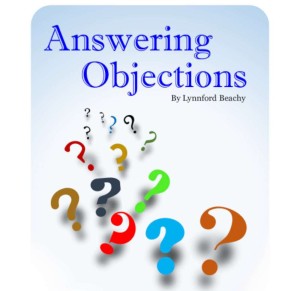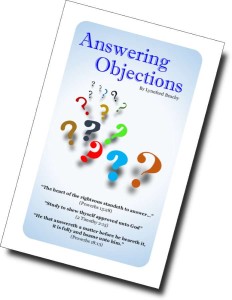 One Means One
One Means One
The Hebrew word echad functions exactly the same in Hebrew as our English word “one.” I could say, “My wife, children, and I make one family.” The word  “family” indicates more than one within it, but the word “one” still means one. If you offer to pay me “one hundred dollars” for a day’s labor, it would be wrong for me to expect to receive two hundred or more dollars just because the word, “hundred,” that follows “one” indicates plurality within it. If I came to you the next day and you agreed to buy my wristwatch for “one dollar,” it would be illogical for me to expect you to pay me three dollars. It would not help my case for me to claim, “You used the word ‘one’ in a plural sense yesterday, so I expected that you would give me at least two dollars for my watch because one is plural.” It is easy to see how illogical my position would be if I followed this line of reasoning. If I were to try to take you to court to sue you for the extra money I feel entitled to, the judge would dismiss my case immediately because it is based on a false premise.
“family” indicates more than one within it, but the word “one” still means one. If you offer to pay me “one hundred dollars” for a day’s labor, it would be wrong for me to expect to receive two hundred or more dollars just because the word, “hundred,” that follows “one” indicates plurality within it. If I came to you the next day and you agreed to buy my wristwatch for “one dollar,” it would be illogical for me to expect you to pay me three dollars. It would not help my case for me to claim, “You used the word ‘one’ in a plural sense yesterday, so I expected that you would give me at least two dollars for my watch because one is plural.” It is easy to see how illogical my position would be if I followed this line of reasoning. If I were to try to take you to court to sue you for the extra money I feel entitled to, the judge would dismiss my case immediately because it is based on a false premise.
The above argument is very easy to dismiss as illogical. Yet, when the same type of flimsy argument is used to support the trinity, by the use of the word echad, many people accept it as gospel truth. Even theologians grasp onto this reasoning and repeat it in their works, until it is so often repeated that it takes on the appearance of fact. We must not rest content with man-made theories that have no basis in reality to support our belief in a doctrine. The fact that trinitarians have to go to such lengths to seek for support of the trinity is virtually proof that it is not true. When a person needs to grasp at straws to support their position it is a good indication that their position is not worth holding up.
The Hebrew word echad in its singular form, as in Deuteronomy 6:4, means one and only one in every case. There is not even one example of echad in its singular form meaning more than one, even though it is used over 900 times in the Bible. When God inspired Moses to say, “Hear, O Israel: The Lord our God is one [echad] Lord,” He meant just that. There is one, and only one, “Lord our God,” and not a unity of three gods.
In case the evidence examined is not enough to settle the matter, Jesus gave us a divine commentary on this verse that we can be certain is truthful. Jesus quoted this verse in Mark 12. A Jewish leader approached Him and asked, “Which is the first commandment of all? And Jesus answered him, The first of all the commandments is, Hear, O Israel; The Lord our God is one Lord: And thou shalt love the Lord thy God with all thy heart, and with all thy soul, and with all thy mind, and with all thy strength: this is the first commandment. And the second is like, namely this, Thou shalt love thy neighbour as thyself. There is none other commandment greater than these. And the scribe said unto him, Well, Master, thou hast said the truth: for there is one God; and there is none other but he: And to love him with all the heart, and with all the understanding, and with all the soul, and with all the strength, and to love his neighbour as himself, is more than all whole burnt offerings and sacrifices. And when Jesus saw that he answered discreetly, he said unto him, Thou art not far from the kingdom of God. And no man after that durst ask him any question” (Mark 12:28-34).
Notice the exchange here. Jesus quoted Deuteronomy 6:4, and then the scribe commented on this verse, “…there is one God; and there is none other but he…” Here we find that this Jew understood Deuteronomy 6:4 to mean, “There is one God; and none other but he.” In case trinitarians are uncertain whether echad indicates exclusive singularity this Jew used very precise and exclusive language. Three statements indicate singularity. He said, “There is one God” and “there is none other” and “he.” This Jewish leader understood that God is a singular individual being and none other but He. When we compare this verse with John 8:54 we find an interesting connection. Here Jesus was dialoguing with the Jewish leaders when He said, “If I honour myself, my honour is nothing: it is my Father that honoureth me; of whom ye say, that he is your God.” When a Jew says “God” they are referring to the Person Jesus identified as His Father, and this verse demonstrates that Jesus knew that the Jews had this understanding. In Mark 12:32 it is certain that the scribe understood Deuteronomy 6:4 to be referring exclusively to God, the Father, as the one and only God, beside whom “there is none other.”
When Jesus heard this, the Bible says, “Jesus saw that he answered discreetly [or wisely].” Jesus recognized that this man answered well, and then Jesus said, “Thou art not far from the kingdom of God.” Jesus did not correct this man for his understanding, but instead complimented him for his good answer. Here is divine approval for the understanding that echad literally means one and only one in Deuteronomy 6:4.
In contrast to Jesus Christ’s commentary on Deuteronomy 6:4, notice what some commentators say about it:
“This does not mean Jehovah is one God, …” (Keil & Delitzsch OT Commentary on Deuteronomy 6:4).
“The three-fold mention of the Divine names, and the plural number of the word translated God, seem plainly to intimate a Trinity of persons, even in this express declaration of the unity of the Godhead” (Matthew Henry Commentary on Deuteronomy 6:4).
“One in Three, and Three in One. Here are three words answering the three persons” (John Trapp’s Commentary on Deuteronomy 6:4).
It is amazing what some people can read into the Bible that is not there. There is no way that Moses or any of his contemporaries would have understood Deuteronomy 6:4 to have reference to a trinity or any more than just one Person. The only way a person could find that theory in this text is if they already had the preconceived idea before reading it. This is something that could not have happened until the Catholic Church formulated the doctrine in the fourth century AD, just as prophesied in Daniel 11:36-39.
The New Testament has just as strong language to signify the singularity of God as is found in the Old Testament. Jesus said, “And this is life eternal, that they might know thee the only true God, and Jesus Christ, whom thou hast sent” (John 17:3). Jesus called His Father “the only true God,” and Paul wrote, “As concerning therefore the eating of those things that are offered in sacrifice unto idols, we know that an idol is nothing in the world, and that there is none other God but one. For though there be that are called gods, whether in heaven or in earth, (as there be gods many, and lords many,) But to us there is but one God, the Father, of whom are all things, and we in him; and one Lord Jesus Christ, by whom are all things, and we by him” (1 Corinthians 8:4-6).
Yachid
Trinitarians would have us believe that if Moses had wanted us to believe God is only one numerically single individual that he would have used the word yachid instead of echad. Yet, this is definitely not the case. We have already seen that echad is equivalent to our English word “one.” Yachid means, “only, only one, solitary, one, unique, only begotten son” (Brown-Driver-Brigg’s Hebrew Lexicon). Yachid is only used 12 times in the Bible, 8 of which refer to only begotten children. The remaining 4 instances are used to mean “solitary” or “lonely” in a negative sense. It is much more likely that if Moses had wanted to indicate that God is one singular individual he would have used echad rather than yachid, and that is precisely what he did.
In any language the word for the numeral “one” is widely used. We find the English word “one” in the Old Testament over 1,000 times. The majority of those times it was translated from the Hebrew word echad. Yachid, on the other hand, is only used 12 times and most often refers to only begotten children. The fact that this word is not used in reference to God, the Father, is not surprising at all. To argue that since this word is never used for God then He must be a plural being does not make sense. To argue from the lack of evidence is not a wise premise. The fact is, there are many verses that employ very exclusive singular terms for the Father, such as “one God,” “none other,” “none else,” “beside me there is no God,” etc. It is not necessary to conclude that since God did not use a particular word to indicate His singularity that He must not be a single Person. There are lots of single items or persons in the Bible that are not described by the use of yachid. Are we to conclude that they are not singular because the obscure word we want God to use is missing? If God, the Father, wanted to indicate that He is “only begotten” or “lonely,” then we could expect Him to use yachid. Certainly we would not expect God, the Father, to want to convey these ideas about Himself, so we should expect that He would not use yachid to define Himself.
There is absolutely no biblical basis to claim that since echad is used instead of yachid to define God’s singularity that He must be more than one Person. The biblical evidence is of more value to discover the truth than any man-made commentary or dictionary definition. The facts are clear, “There is but one God, the Father” (1 Corinthians 8:6).
